No Flag For Me
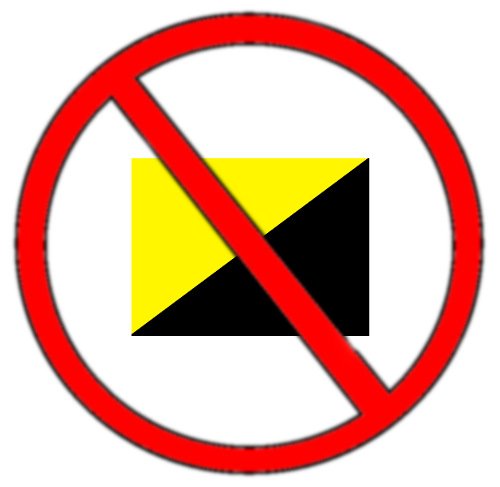
I’ve never been inclined to use the anarcho-capitalist flag (the yellow and black thing). This is not because I think there’s anything really wrong—morally or philosophically—with using symbols to represent ideas, but only because it seems a bit weird to me to display a symbol that means a lack of a belief in a particular thing. (Before anyone gets riled up, this isn’t a criticism or complaint; just a personal preference.)
“Anarchism” means being opposed to the existence of a ruling class. And “capitalism,” once upon a time, just meant human economic interaction without interference by the state. (If you ask me, that makes the term “anarcho-capitalism” redundant, but that’s another issue.)
The word “anarchism,” in and of itself, does not describe a complete philosophy. Instead, it merely describes one thing that a person opposes: having a ruling class. It really just expresses one negative belief—the idea that one certain thing shouldn’t exist—while not saying anything about anything else. (The term “voluntaryist,” in contrast, has a more specific and positive meaning: the idea that all human interaction should be voluntary, and by consent.)
By analogy, suppose there was a term for someone who didn’t believe in Santa Claus. Let’s call such people “anti-Santa-ists.” And suppose the anti-Santa-ists made a flag with an image representing this belief. How weird would it be for them to proudly display that? Why would someone primarily define themselves by pointing out one thing that they don’t believe in?
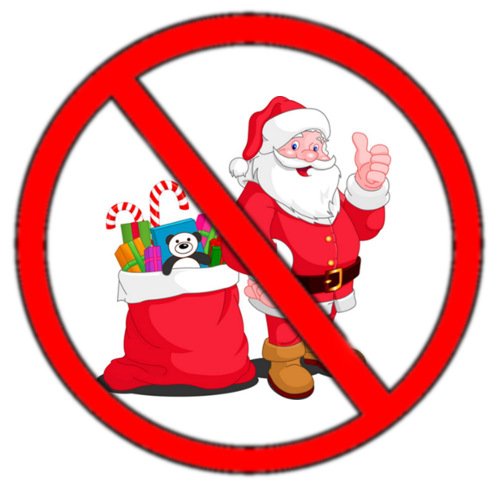
Granted, since the vast majority of people today do believe that violent aggression is justified, even necessary, if and when it is carried out via “government,” it is quite significant when someone doesn’t. And if millions of people were being oppressed or murdered in the name of Santa Claus, maybe an anti-Santa flag would be understandable. Nonetheless, usually a flag or similar symbol represents some positive belief, or set of beliefs, or some overall agenda or master plan shared by all those who display that flag or symbol. A flag more or less means, “This is what I stand for!”
But how does one zealously and actively engage in non-statism? Some will answer, by trading privately, doing the agorism thing, using alternative currencies, using private defense or dispute resolution methods, and so on. But really that's just doing a bunch of things that aren't statist. Again, by analogy, imagine that someone made an “anti-murder” flag, and proudly displayed it. Obviously I’m all in favor of not committing murder, but what would the point of such a flag be? What would an anti-murder organization or “movement” look like? Would they proudly list and advertise all the things they do which aren’t murder?
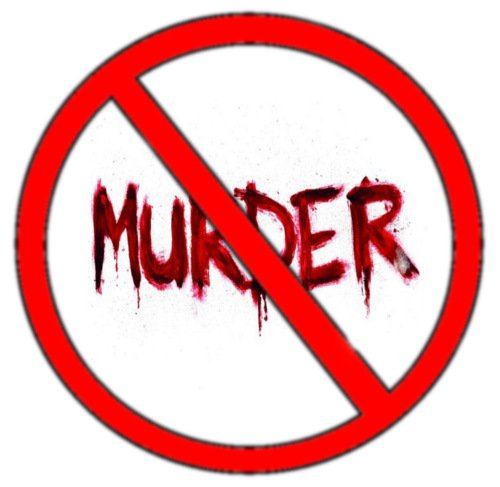
A: “Hey, buddy, I noticed your flag. What are you guys all about?”
B: “We’re about not murdering people.”
A: “Um, okay. That sounds good. But what does your movement do?”
B: “We go around not murdering people.”
A: “Is that all? I mean, I’m glad to hear it, but is that all you do?”
B: “Well, individually we each do lots and lots of things that aren’t murder.”
A: “Do you go out and try to stop murderers?”
B: “Some of us do, but it’s not a requirement. Want to join our organization?”
A: “Well, I already don’t murder people. What would I gain by joining?”
B: “A cool flag.”
Okay, so maybe I’m being overly flippant and nitpicky here, but to me a flag tends to represent a movement, or an organization, or an agenda, or some master plan. And for the most part, I don’t really have any use for any of those. I have no desire to rally under a flag, whether it be anti-Santa, anti-murder, or anti-statism. Maybe this is partly because once something seems like a “movement,” I expect it to be hijacked and corrupted, after which it turns into a self-serving drama spectacle, with different people trying to be “leader,” before in-fighting and personality conflicts crash it into the ground.
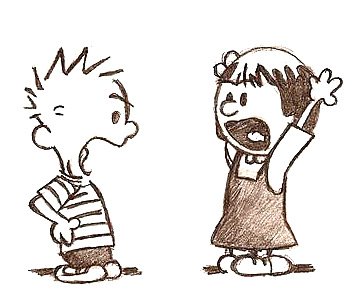
I suppose the yellow and black might at least sometimes be a good conversation starter. If someone asks what the heck it means, the person might have a chance to explain a bit about voluntaryism or anarcho-capitalism. But to me, a flag still implies some club or gang to join, or some banner to march under while screaming vague slogans into a bullhorn. Maybe it’s just me, but I don’t associate the whole concept of a flag with “exercise peaceful coexistence, don’t be an aggressive douchebag, and don’t vote for someone else to be an aggressive douchebag on your behalf.”
Again, I’m not saying that other people shouldn’t use it, or saying there’s anything actually wrong about it. I just suddenly felt compelled to fling out this relatively pointless blurb about why I’m instinctively “anti-flag.” Hmmm, maybe I need a flag that represents those of use who don’t like to use flags to represent our beliefs. Then we can start a movement, become militant, and move to forcibly eradicate all flags from society! (Or not.)
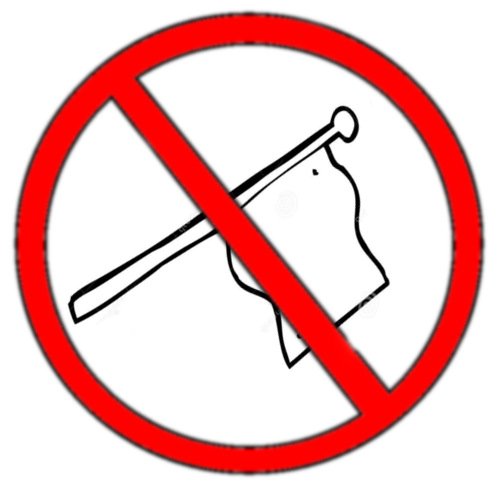
no flag no country.. Im good with that bring on the Internet world citizens
Stated in positive terms, I'd define anarchy as recognition of equal human rights (none have a unique/asymmetrical right to rule others), and capitalism as specifying that human rights are best defined as exclusive relationships between individual humans and specific scarce resources.
I agree that "anarcho-capitalism" could be considered redundant as I think each half logically implies the other, but given the degree of confusion and controversy a bit of redundancy for clarity isn't a bad thing.
What happens is that at the political level and in terms, both anarchism and anarcho-capitalism, they represent concrete ideas that are not perfectly alike.
I great post made even better by the Calvin and Hobbes illustration. Excuse me, Calvin and Susie.
Bill Hicks, a personal favorite of mine, had a great bit on this!
Did not know you were here! THANK YOU for this, and all you have done for so many years. We are a modern day Babylon, with people using words that mean one thing to them and the exact opposite to the person they are trying to communicate with.
tip!
I too do not understand the concept of organizing under the banner of any form of anarchy. It defeats the whole meaning of anarchy.
There are two fundamental problems with anarchocapitalism
private law, private violence companies, private judges and individuals forcing their values and beliefs on others through purchasing these is not anarchist, it is merely private statism. Anarchism merely states opposition to all external authority, conflict resolution, and economic models are not defined. NAP is nice and all but its a human protocol not a part of anarchism. that said i like the NAP although there are multiple forms of agression not just violence altough its the worst.
Land cannot be owned only possessed
land can be used, and built upon, but being 3d land mammals we require a 3d just to exist. Using violence to hoard land you do not use prevents others from freely using to cover their needs and forms a monopoly over the land, causing the renters to be economic slaves to the landlords. This requires a more indepth analysis but i would be happy to provide it.
That said capital (goods that create goods) can be privately owned. Land is a complex thing that cannot be allowed to be monopolized. Besides who determines that? no one. Anarchism requires a lot of common sense to work, not a fixed code like the NAP or others.
It's a principle, nothing else The things people call it, or the things they derive from it is a second thing. But it's not to say that that is the thing that will be the case.
For instance a private DEFENSE company may be something that follows but it's not a given. It could just as well be a neighbourhood watch or a defense organization with volunteers, or maybe someone says; I defend myself.
Or I defend my family.
Again it's a principle not a system,not a fixed code, not a human protocol, I've seen some people think of it like a constitution, or someone who wants to make a contract and let everybody sign it. Some think it's a law that needs to be implemented. It's a principle nothing else.
I would say that there is more...
I think that the incentive would be to not own so much property that you could not afford to manage it. The larger the property owned the harder/more expensive it would be to keep it from those who would squat on/ take over it. It seems to me that the less you own in an an-cap society the better off you are. I could be wrong. This is all off the cuff.
The slaves love their corporate flags 😂.
I'm with you. 😃 But a nefarious little faery in my novel, To Coin a War, would disagree with you:
“A pulchritudinous parlance can propel a people, Gavenleigh, no one knows that better than I do.” [Brighid] slapped a coin on the bar. “But you can't wave words on a flagpole.”
Let's make this world a global world
Where people have love , prosperity, and so on
Most important understanding